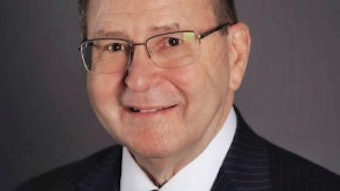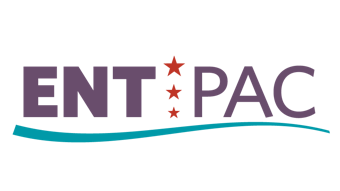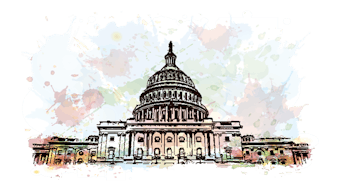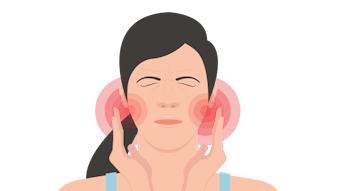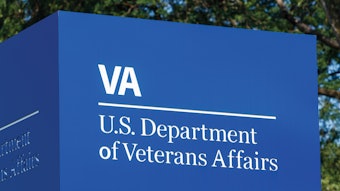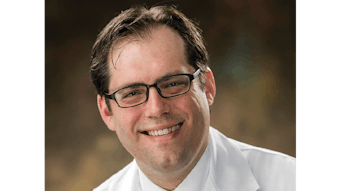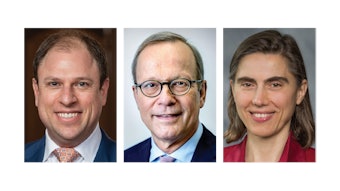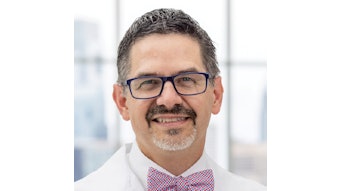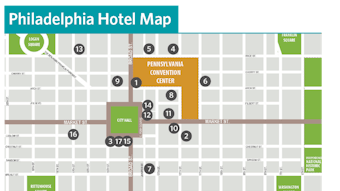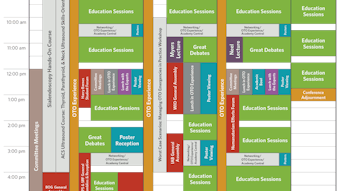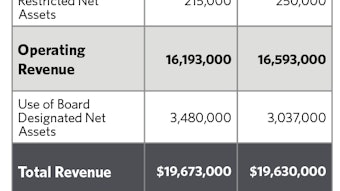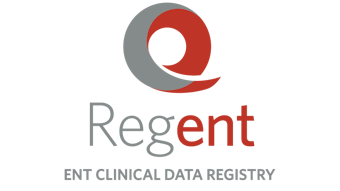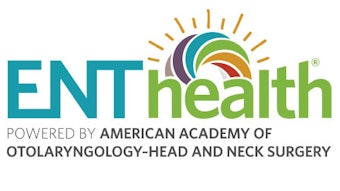Advocacy Interviews
Hear from your colleagues who have incorporated advocacy into their commitment to the specialty and their patients.
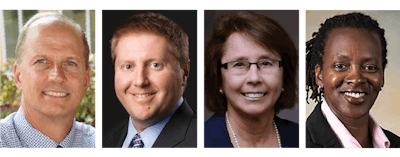 Left to Right: Douglas D. Backous, MD, R. Peter Manes, MD Coordinator for Advocacy, Karen A. Rizzo, MD Board of Governors Chair-elect, Yolanda L. Troublefield, MD, JD Board of Governors Legislative Affairs Committee Chair
Left to Right: Douglas D. Backous, MD, R. Peter Manes, MD Coordinator for Advocacy, Karen A. Rizzo, MD Board of Governors Chair-elect, Yolanda L. Troublefield, MD, JD Board of Governors Legislative Affairs Committee Chair
Throughout the Academy’s history, it has been the groundswell of support and participation of the members that has strengthened the organization’s ability to affect change for the practicing otolaryngologist-head and neck surgeons and your patients. The following members sat down with Academy staff to share their thoughts and experiences in the advocacy arena: Douglas D. Backous, MD; R. Peter Manes, MD, Coordinator for Advocacy; Karen A. Rizzo, MD, Board of Governors Chair-elect; and Yolanda L. Troublefield, MD, JD, Board of Governors Legislative Affairs Committee Chair. Hear from your colleagues who have incorporated advocacy into their commitment to the specialty and their patients.
Tell us a little about you, your practice, and your experience with advocating for the specialty.
Dr. Backous: I am a neurotologist practicing in the Seattle, Washington area. I have practices in the south end of the Puget Sound region and up north in Edmunds, Washington. I have been in Seattle for my entire career after training at Baylor for my residency and Johns Hopkins for my fellowship. My practice is limited to otology and neurotology, and I have been boarded at both levels with the American Board of Otolaryngology — Head and Neck Surgery.
Dr. Manes: I am a rhinologist at Yale School of Medicine, I have been there almost 12 years now. I first got involved with the Academy on our RUC team, which works to value new codes and revalue current codes. Through that work I was exposed to a variety of different aspects of health policy, including advocacy efforts both with private payers as well as government institutions.
Dr. Rizzo: I am a general otolaryngologist in private practice in Lancaster, Pennsylvania, for 31 years. I have been very much involved in advocacy both at the state level and nationally since I finished my training at [Thomas] Jefferson [University Hospital] in 1990. I have been the president of the Pennsylvania Academy of Otolaryngology as well as president of the Pennsylvania Medical Society. In both of those capacities, I did a lot of advocating on behalf of our specialty as well as the house of medicine for issues that impact patient care, socioeconomic concerns, as well as legislative issues.
Dr. Troublefield: I am a general otolaryngologist. I practice with four other physicians as well as a few other part-time physicians. We are associated with three hospitals, one of which is the second busiest emergency room in the state of Massachusetts outside of Boston. Working with local groups, our legislatures in the state, and on the federal level allows us to bring the kind of care that we believe all the Massachusetts patients deserve.
What was the impetus of your involvement in the Academy’s advocacy efforts? How did you get started and what are some things that you have done?
Dr. Backous: My experience with advocacy goes back to newborn hearing screening in 1999 in the state of Washington. We really had to work together with the representatives from the Deaf community and representatives from the various hearing organizations in the state to convene people and to come together as a united front to find some common ground—to promote newborn hearing screening. We ultimately agreed that we wanted all children to be identified and then they would have a choice as to what pathway they would take.
I think the big issue when advocating is to really understand what change we're looking for and what we're targeting from our side of the story. We then need to listen to others as they lay out their needs and try to find that common thread. I've been advocating quite a lot for the specialty—since prior to 2010—whenever asked on a state level and more recently at the federal level.
Dr. Troublefield: My former partner was incredibly involved in advocacy, deeply involved in bringing the specialty to a higher level in terms of its awareness of how legislation and regulation impact us. She got me involved in the Massachusetts Society of Otolaryngology (MSO). Through my involvement in the MSO, I became aware of what kind of impact I could have in helping my patients by working within the legislative process. From the MSO, I had the opportunity to work on a lot of local legislation, and then I became more involved in the Academy. Surgeons are results-oriented people, so being able to work on initiatives that impact medical care delivery allows you to actually see the impact that you have on our specialty.
What has your favorite experience with advocating for the specialty and patient care been? Do you have any advocacy “wins” that you are particularly proud of?
Dr. Manes: One thing that I am most fond of doing is our Advocacy Day that takes place on Capitol Hill often in the spring. This year it was virtual, but I just think it is a terrific experience. Advocacy Day is where you have an opportunity to speak with people who are making the rules; you get to tell them your stories and your patients’ stories. And whether things work out the way you want them to or don’t, at least you feel at the end of the day, you were able to share your prospective, your patients’ prospectives, and your voice was heard. You’re not always going to win, but you are always going to have that opportunity to present your story.
Dr. Rizzo: Probably my most impactful win, if you will, was when I sat on the Speech Language Pathology and Audiology Board in Pennsylvania representing otolaryngology. Many times that body tried to present bills modifying their prospective on independent practice, trying to remove physician oversight and trying to have direct access to Medicare patients, which is what they still continue to ask for at the federal level. On two separate occasions I was able to modify the language on these bills. In essence, they did not progress because of the concerns we had as a specialty. I thought that was significant, at least for Pennsylvania, and I hope we will get to the same endpoint at the national level.
Why do you think it is important that you and others in the specialty continue to be involved in advocacy? How does it benefit and impact current and future practice and patient care?
Dr. Rizzo: I think advocacy is an opportunity to communicate, educate, and collaborate with elected leaders on issues that are important to us as a specialty. Advocacy allows us to be a source of information for the legislators to help them make decisions on bills and on regulations that impact the way we practice. It allows us to be a champion for our patients’ needs, and at the end of the day, it allows us to do our jobs in a better way, which has a significant impact on the quality of care we give to our patients and helping them achieve happier and healthier lives.
Dr. Troublefield: Medicine isn’t practiced in isolation. There are many different stressors on the system. One of the problems with the system is that many patients feel that they are not the focus of our intricate healthcare system and when it comes to meaningful change they are on the outside looking in. So, who else to be their advocate but their physicians? We are their safeguard. We are the person they can come to with lots of other issues. And being an advocate for patients allows us to continue to advance the practice, to make new discoveries by partnering with agencies such as the CDC or the NIH. We are the ones who are practicing medicine so we have the intricate knowledge to help our representatives understand the things that we need to help take care of the American population. It’s got to be done.
How would you finish this phrase:Without advocacy…
Dr. Backous: Without advocacy, patient care would flounder. When you look at elected and agency officials and regulators, they’re tasked with an enormous job. At the end of the day, the government is about how they allocate funds. And what we’re doing is important enough to get a piece of that spending that’s going to improve the overall health and well-being of their constituents.
Dr. Manes: Without advocacy, the specialty would fall more out of our hands. We are the best advocates for ourselves and for our patients, and we want to maintain that. If we ignore those responsibilities someone else is going to make decisions for us. We want that seat at the table. We want the input. We won’t like the outcome if we don’t have it.
Dr. Troublefield: Without advocacy, the specialty would suffer tremendously. Because of the complexity of the healthcare system, it is difficult for our patents to have a deep understanding of what occurs in the background in terms of payments, insurance, and oversight. They implicitly look to physician leaders to fight for their healthcare needs. On the other hand, from a legislative standpoint, we can't expect our representatives to know what we do on a day-to-day basis. So, without providing them with the critically relevant information, they would make decisions in a vacuum. Without advocacy, we would have a really broken healthcare system.
What tips can you share for someone who wants to get involved but isn’t sure where to start.
Dr. Backous: I would borrow from Nike; I would say just do it. I view the advocacy division at the Academy as fly fishing guides. You do not need to know how to fly fish to catch a fish on a fly-fishing guided trip. They will put you in a raft, they'll put the life vest on you, they'll put the pole in your hand to tell you where to cast. That's how the Academy has provided a framework for people to advocate effectively, which takes a lot of the stress away when learning how to do it. I think the Academy does a very good job setting people up with specific content, the points that we're trying to get across, and also provides opportunities in follow-up calls after those advocacy efforts to talk about what we learned.
Dr. Manes: I think there are a couple ways you can get involved. One is to respond when large calls to action come out, which I think is important because a lot of people say to themselves, “I’m not very knowledgeable about this,” but that’s not the case. You’re a content expert and that is vital in this process. So, try to step up when asked. And then there is also presenting yourself as someone who is interested in this, and how do you do that? Well, I think a great way is getting involved with the Academy. Making connections to those who are involved will allow you to become more involved. It is daunting and none of us have hours of unstructured time, but that is not what it takes. Advocacy for our specialty is not a new career—this is something that you can do to assist yourself, your colleagues, and your patients in smaller doses.
How have prior authorization requirements impacted your practice? Specifics on other issues we advocate on (Medicare reimbursement, scope, state issues, etc.)
Dr. Manes: We don’t talk about it often, but it affects one’s bottom line. If we know anything, it’s that we know physician reimbursements have not kept pace with inflation. If you ask someone if they would be okay making less per unit work time now than they did in the 1990s, chances are they would not feel very good about that. And how does that then affect us? It can affect patient access and the ability to take care of patients in a variety of different ways, such as the ability to see Medicare patients. It can also affect the ability to hire enough staff, to have enough supplies in one’s office in order to provide a volume of care that you want to provide to people. So, it ends up affecting you in so many different ways. It’s actually about the ability to provide care for your patients.
Dr. Rizzo: In my practice alone, I have a full-time employee dedicated to getting prior authorizations done for medications, CT scans, MRIs, surgery, and it’s such a time-consuming process. If you look at the process and the time that is involved to get it done, it can last from minutes, to hours, to even days, especially if you have to do a peer-to-peer review. At the end, 98% of the time, whatever we are asking for gets approved, so the waste of time, energy, and cost on the office side to get that done is a big frustration and burden for most practices and patients. They can’t get the tests done to answer the question or they can’t get the medication that they are waiting for to help them feel better, so they leave the office also frustrated and anxious. The whole process just leads to a delay in diagnosis, a delay in treatment, and at the end of the day it’s the patient who suffers.
Dr. Troublefield: I had a patient who was a long-time smoker who came into the office with a pronounced hoarseness. I suspected that she had cancer and as a part of her work-up needed a CT scan before going to the OR to perform a direct laryngoscopy and biopsies. Her surgery was delayed by a week and a half because of prior authorization. This lengthy process led to delay in care, and added stress and anxiety experienced by my patient. To a cancer patient, a week and a half seems like years. In my mind, to place this burden on a patient is entirely unacceptable.
